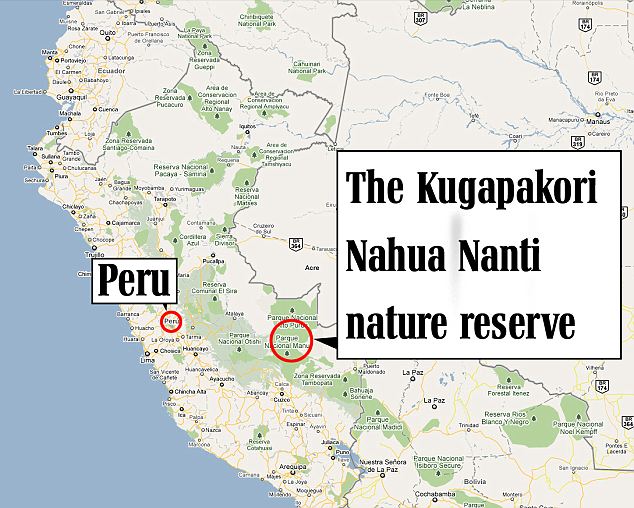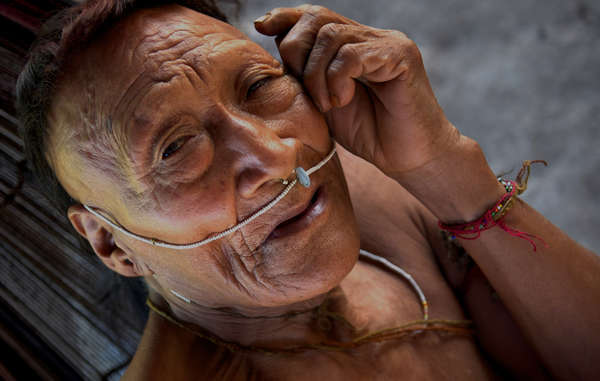Peru Approves Gas Project Within Native Reserve
posted on March 18th, 2014 in Amazon Jungle, Indigenous Rights, Uncontacted Tribes

The Kugapakori Nahua Nanti Reserve on the border of Manu National Park, Peru
(Note: the author of this blog lived in this area of Peru with the recently contacted Nahua (Yora) in the late 1980s. The uncontacted Nahua’s land was originally invaded in the early 1980s by Royal Dutch Shell Oil, which detonated explosive charges in their territory. The invasion ultimately led to the Nahua’s contact with the outside world. Roughly 30% of the Nahua population died within two years of the contact, due to an epidemic of whooping cough, for which they had no natural defense.The Peruvian government created the Nahua-Kugapakori Territorial Reserve in 1990 to protect the territorial rights of the Nahua, Nanti (uncontacted Machiguenga) and other uncontacted or recently-contacted peoples living in the area. The reserve also serves as a buffer to Peru’s enormous Manu National Park and Biosphere Reserve, one of the most biologically diverse areas in the world. Now, thirty years after their first contact, the Nahua and other groups of isolated indigenous peoples are once again under assault, this time by a new group of oil companies, facilitated by the Peruvian government–KM).
January 27, 2014
Peru Approves Gas Project, Spells Disaster for Uncontacted Tribes
Survival International
Uncontacted Nanti could be decimated by plans to detonate thousands of explosive charges and allow hundreds of workers to flood onto their land.
Peru has approved the highly controversial expansion of the Camisea gas project onto the land of uncontacted Amazon tribes – despite international outrage, the resignation of three ministers, and condemnation by the United Nations and international human rights organizations.
Peru’s Ministry of Culture, tasked with protecting the country’s indigenous population, has approved plans by oil and gas giants Pluspetrol (Argentina), Hunt Oil (US) and Repsol (Spain) to detonate thousands of explosive charges, drill exploratory wells and allow hundreds of workers to flood into the Nahua-Nanti Reserve, located just 100 km from Machu Picchu.
The expansion could decimate the uncontacted tribes living in the reserve, as any contact between gas workers and the Indians is likely to result in the spread of diseases or epidemics to which the Indians lack immunity.
Pluspetrol itself recognizes the devastating impact the expansion could have. In its ‘Anthropological Contingency Plan’ the company states that any diseases transmitted by workers could cause ‘prolonged periods of illness, massive deaths, and, in the best cases, long periods of recovery.’
Protests were held around the world against the plans to expand the Camisea gas project in Peru’s Amazon rainforest.
When oil giant Shell first started explorations in the area, it led to the death of nearly half the Nahua tribe. One Nahua man recounted, ‘Many, many people died. People dying everywhere, like fish after a stream has been poisoned. People left to rot along stream banks, in the woods, in their houses. That terrible illness!’

Raya, a Nahua elder who survived contact.
The project violates Peruvian and international laws which require the consent of any projects carried out on tribal peoples’ land.
Last year, protests were held around the world to stop the expansion of Camisea, and more than 131,000 Survival supporters have sent a message to Peru’s President Humala demanding a halt to the oil and gas work on uncontacted tribes’ land. Today, Survival handed the list of the thousands of petition signatures to the Peruvian embassy in London.
As a result of the high profile campaign by tribal rights organization Survival International, local organizations AIDESEP, FENAMAD, COMARU and ORAU, and others, to stop the expansion, seismic testing has been averted from riverways and the location of one well was moved from the land of an isolated tribe.
Survival’s Director Stephen Corry said today, ‘Thirty years ago workers prospecting for the Camisea deposit penetrated deep into the territory of the Nahua people – and soon after, half the tribe were wiped out by flu and similar diseases. Has the Peruvian government really learnt nothing from history, that it is prepared to risk this happening again for the sake of a few more gas wells?’
